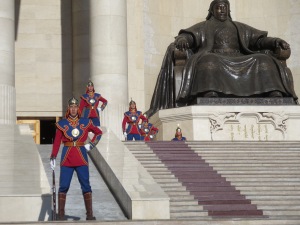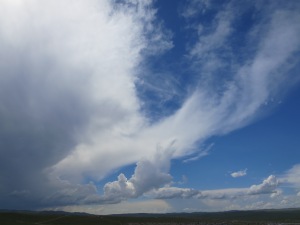Serving as “The Other”
Being an Outsider and Bridging the Gap!
As a white male living in Mongolia, I stand out considerably in a crowd. My pasty skin, dark reddish beard, and long, prominent nose clearly set me apart from ethnic Mongols – which make up nearly 95% of all Mongolians. As an obvious outsider, I receive a wide range of reactions from locals when I’m out in public.
“Hello teacher!” “Hi teacher!” “How are you, teacher?” Female students swarm around me in my university lobby, blocking the hallway back to the office. After spotting me taking photos of the “New Year’s Tree” in the main entryway, a dozen teenagers quickly corner me. Grabbing me by the arm they position me in front of the evergreen. “Here, teacher!” FLASH! The tinsel-covered pine behind us illuminates the entire room. I can’t even see the green needles beneath metallic streamers.
First, the students take individual iPhone photos with me. I feel as much of a prop as the balloons and streamers hanging down from the ceiling. Next, they snap pictures with two or three students on either side of me and, finally, we take several group shots. I smile and wait patiently for the students to finish the photo shoot so I can escape. Meanwhile, the security guard at the front entrance chuckles at the spectacle. He jabs his coworker peering out the window. The second man turns around and begins laughing too.
Later in the day, I prepare for the thirty minute walk to my friend’s apartment across Ulaanbaatar. After putting on my long underwear, wool socks and pants, flannel shirt, leather gloves, fur-lined boots, parka, and neoprene pollution mask, I set off. Carrying two large bags full of groceries for dinner; I prep myself mentally for the grueling walk. Open manhole covers, sidewalks piled high with sand and rubble, live wires, hidden patches of black ice, and reckless drivers; walking across the city is always an obstacle course!
After twenty minutes my arms are burning and I’m getting tired from navigating the uneven and slick footing. The condensation from my breath is freezing on the outside of my pollution mask. My eyelids stick together as my frosty lashes latch like Velcro. I bat my eyes quickly to free them. Grunting, I pick up the pace. I squint against the wind as a group of students walks towards me, five abreast. As I step aside to let them pass on the narrow sidewalk a male teenager leaps at me. He yells something in Mongolian. Suddenly, he swings his open hand inches from my face, turning and smiling to his friends at his demonstration of bravado. I let the unruly youth finish with his antics and continue walking without a word.
Whatever type of response I illicit from Mongolians as I go about my daily life in Ulaanbaatar, I try to view the behaviors as surface ripples of deeper social undercurrents and not take things too personally. In the United States, as much as progressive forces have educated our citizenry about media-driven misconceptions of what it means to be a white male, a black woman, or an Asian child, racial stereotypes still influence behavior. However, in my experience in Mongolia these misinformed overgeneralizations are stronger and more pervasive. Many are treated as fact by large portions of the populace, especially in regards to foreigners.
For example, many Mongolians assume that white males are incredibly rich. When I eat with my Mongolian friends at locally-owned restaurants other patrons are sometimes shocked to see me. “They’re saying how poor you must be to eat here” my friend told me, interpreting the flurry of conversations that erupt around us as we sit down at a table. While I experience the consequences of certain strong assumptions about what it means to be white and male, I will be the first to argue that Mongolians are not racist. While many Americans would be inclined to believe the opposite, I think that it’s simplistic, counterproductive, and even racist to frame the issue in terms so terse. In seeking to make sense of my daily experiences here I’ve often turned to history for answers.
In the 13th century, Genghis Khaan and his progeny conquered most of Eurasia and, unbeknownst to most Westerners, established a rich multi-cultural trading network and largely peaceful empire. The stability created by the Mongolian superpower’s occupation of cities across Europe, the Middle East, and East Asia fostered religious tolerance at a time when the infamous Inquisition was occurring in parts of Europe. Nonetheless, in the ensuing centuries Mongolia retreated from the world stage and returned to its historical roots as homogenous herders on the steppe.
In the early 20th century, a Soviet-backed coup established Mongolia as a de-facto satellite state of the USSR. During the extensive reign, Mongolia’s interactions with nations other than Russia or those of the Soviet bloc were very limited. However, in the early 1990s, after the fall of the Berlin Wall, Mongolia underwent a peaceful revolution and abandoned its Soviet political institutions in favor of democratic ones. Since this period, Mongolia’s economy has been in a state of great transformation, shifting from a state-controlled economic system to a free-market one.
As part of much greater economic and political openness, globalizing forces are influencing its society and culture at an unprecedented rate. It’s only natural that foreigners are viewed in rather polarizing terms by Mongolians. Given Mongolia’s limited recent participation in the modern global political economy it’s not surprising that a number of widely held and poorly-informed beliefs exist about people of different racial backgrounds. The majority of Mongolians haven’t interacted with foreigners from the diverse cultural, ethnic, and linguistic backgrounds to which they’re suddenly being exposed.
So, how do I cope with being an outsider during this momentous cultural shift? How do I deal with constantly feeling like I’m being judged entirely by my appearance or interacted with based on superficial stereotypes? [This also makes me question how it feels to be a minority of any kind in my home country too, although the cultural context is very different from the one in which I’m operating.] It’s tempting at times to try to keep my distance and create a comfort zone removed from unnecessary interactions with Mongolians. However, my experiences with locals have been the most-rewarding and educational ones during my time here! Withdrawing from the culture I’m embedded in is not a healthy or productive option. Engagement is the only viable way forward!
Based on my experiences so far, here are three tips for engagement for those entering or currently in service abroad:
- Find a language exchange partner!
o While learning a new language can be daunting, knowing the basics is essential to interacting with locals on a daily basis and at the very least demonstrates a degree of respect for their culture and language. I’ve never studied an Asian language before and I admit my Mongolian proficiency after nearly six months is very low. Still, coordinating informal Mongolian lessons with a friend interested in improving his English has been very fruitful. Besides learning bare essentials like greetings, numbers, directions, etc. these meetings can be great ways to network and find out about opportunities only locals know about! These meetings have resulted in outings to go hiking, play ping pong, cook regional delicacies and many more opportunities.
- Get involved in extracurricular activities!
o Especially if the language barrier is very difficult to overcome, seeking activities that require little or no language comprehension to communicate or express yourself can be very rewarding. In my free time I’ve played volleyball, billiards, and sang karaoke with Mongolians with varying levels of English proficiency. Team sports are great because they offer good chances to bond with co-workers or peers in an environment where conversation or dialogue isn’t necessary. Take a chance and don’t be afraid to look awkward. You probably already do in the eyes of your hosts and you may show off some hidden talents you didn’t know you had!
- Try to be patient, flexible, and adaptable!
o There are many unexpected surprises that lie ahead during your service term! (I’m sure there are many in store for me.) Try to embrace these opportunities when they present themselves, even if people “voluntell you” to do things you otherwise wouldn’t seek out. For example, the day before my school’s New Year’s party, my supervisor approached me with a grave look on her face. “Tomorrow, singing competition. Represent department. Do you have a song?” “Excuse me? There’s a singing competition at the party?” “Yes.” “And I’m representing the entire department?” “Yes. Are you ready?” “No, not yet! You just told me about it… But I can come up with something. Let’s talk tomorrow.”
36 hours later I was performing “Christmas, Baby Please Come Home” on stage to a crowd of well over a hundred people. Terrifying! But, in retrospect it helped me get more comfortable on stage in front of large groups which I’m thankful for. It also helped me gain recognition for my department and status for my co-teachers which is very important culturally. You never know what form chances for engagement will take!









Nice post Peter… It certainly is a good read 🙂
Thanks a lot for sharing your first hand experiences from this less explored part of the world.
Thanks for reading, Sreejith, and for the comment! It’s always my pleasure!
This is great. Well done. You’ve helped me reconcile a lot of feelings I’ve had standing out so much in Zambia. Thank you very much!
Thanks, Emily! Hope you’re having a great experience there! It can certainly be difficult at times being immersed in a (relatively) homogeneous culture but more than worth it in the end! By the way, I love the photos on your webpage and have similar feeling anticipating the end of my term here. All the best, Peter